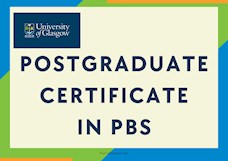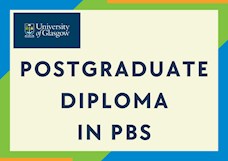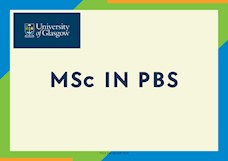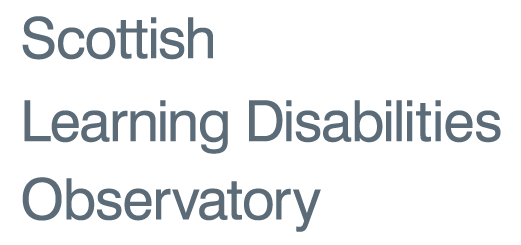Positive Behaviour Support (PBS) course details

Postgraduate Certificate in PBS
The Postgraduate Certificate in Positive Behaviour Support (PBS) consists of three courses taught over one year. The aim of the programme is to teach students how to develop and implement person-centred PBS plans for individuals with intellectual disabilities and challenging behaviour. This will include all aspects of PBS, including quality of life, environmental changes, active support, augmentative communication, and reactive strategies.
The three courses in the Postgraduate Certificate are:
• Understanding and Assessing Challenging Behaviour
• Developing and Implementing PBS Plans
• Implementing PBS Using Practice Leadership
The programme will develop understanding of approaches to the implementation of PBS, and students will learn practical skills to design, implement and monitor PBS interventions to improve quality of life and promote well-being in individuals with intellectual disabilities.All teaching is delivered online by both University of Glasgow staff and guest lecturers who are PBS expert practitioners or PBS researchers. Teaching includes pre-recorded sessions to be completed flexibly at a time to suit students, as well live group teaching sessions held regularly throughout each term. The live group sessions are participatory and include group exercises and practice-based discussions in small groups. In addition to the live group sessions, there are practical tasks to be carried out in the student’s workplace which will allow for learning to be transferred to practice.
Applicants must fulfil all of the following entry requirements:
- Minimum 2:2 honours degree, typically in nursing, psychology, social work, or other relevant social sciences, OR comparable professional qualifications.
- At least three years relevant experience working with people with intellectual and developmental disabilities.
- All applicants must have a current role in supporting people with intellectual and developmental disabilities.
Upon completion of the Postgraduate Certificate, students can leave with that qualification, or can choose to continue their studies for another year, in order to complete the Postgraduate Diploma in PBS.

Postgraduate Diploma in PBS
The Postgraduate Diploma in Positive Behaviour Support (PBS) consists of six taught courses over two years. The first three courses comprise the Postgraduate Certificate and it is essential to have completed the Postgraduate Certificate courses before starting the Diploma.
The three courses in the Postgraduate Diploma are:
• Complex Care Needs & PBS
• Advanced Strategies in PBS
• Implementing PBS in Systems
The Postgraduate Diploma will build on students’ knowledge from the Postgraduate Certificate and will support them to learn skills relevant to the design and delivery of PBS interventions for individuals with complex care needs, including a range of mental and physical health issues. Throughout the programme there will be a focus on implementing PBS in a range of settings and contexts. Students will learn about different theoretical approaches to the implementation of complex interventions and then will explore how implementation science can support the delivery of PBS.
All teaching is delivered online by both University of Glasgow staff and guest lecturers who are PBS expert practitioners or PBS researchers. Teaching includes pre-recorded sessions to be completed flexibly at a time to suit students, as well live group teaching sessions held regularly throughout each term. The live group sessions are participatory and include group exercises and practice-based discussions in small groups. In addition to the live group sessions, there are practical tasks to be carried out in the student’s workplace which will allow for learning to be transferred to practice.
Upon completion of the Postgraduate Diploma, students can leave with that qualification, or can choose to continue their studies for another in order to complete their MSc in PBS.

MSc in PBS
The MSc in Positive Behaviour Support (PBS) is a unique qualification in the UK which is well-placed to meet Scottish and UK Government guidance in relation to best practice for supporting people with intellectual disabilities and complex needs. The programme is designed to address a skills gap within services for people with intellectual disabilities and challenging behaviours, including in health, social care, and education settings.
The MSc consists of six taught courses delivered over two years and a Practice Portfolio to be completed in the third year. It is essential to have first completed the Postgraduate Certificate and Postgraduate Diploma before proceeding to the Practice Portfolio.
The three courses in the Postgraduate Certificate are:
• Understanding and Assessing Challenging Behaviour
• Developing and Implementing PBS Plans
• Implementing PBS Using Practice Leadership
The three courses in the Postgraduate Diploma are:
• Complex Care Needs & PBS
• Advanced Strategies in PBS
• Implementing PBS in Systems
The Practice Portfolio forms the third year of the MSc in PBS. It is designed to evidence that students have developed skills relevant to demonstrate competence in implementing PBS at tier one, tier two and tier three. The course is assessed through a Practice Portfolio and an oral examination testing the integration of knowledge and research into practice. The Practice Portfolio will be completed over one academic year. There will be monthly online tutorials, as well as individual supervision. There will also be a range of pre-recorded lectures and learning materials for students to work through flexibly.
The aim of this course is to support the development of relevant competencies from the PBS Competence Framework. The course aims to ensure that students have the skills and knowledge to complete a practice-based portfolio demonstrating their clinical competence in implementing PBS with a range of individuals with intellectual and developmental disabilities, across a range of settings and services, and presenting with a range of needs and behaviours.
Further information
Website: https://www.gla.ac.uk/postgraduate/taught/positive-behaviour-support/
Course coordinator: Dr Anne MacDonald anne.macdonald.2@glasgow.ac.uk
Course administrator: Dr Natalia Jonsson-Skradol Natalia.JonssonSkradol@glasgow.ac.uk
Information about fees:
https://www.gla.ac.uk/postgraduate/taught/positive-behaviour-support/#tab=fees
